Dogs are beloved pets and considered a part of the family. As such, owners want to make sure they provide their furry friends with the best possible care, including a healthy diet. One question that often arises is whether dogs can eat nuts. The answer is not straightforward, as some nuts are safe for dogs to eat while others can be harmful.
In this article, we will explore the question ‘Can dogs eat nuts?’ and discuss the nutritional value and its potential impacts.
Can Dogs Eat Nuts?
Yes, dogs can eat nuts. As curious eaters, they might be eager to try various foods, including nuts. However, not all nuts are safe for dogs, and some can pose severe health risks, even leading to fatal consequences. Being aware of which nuts are safe and which ones to avoid is crucial for responsible pet owners.
Nuts are a good source of healthy fats and protein for humans, but not all nuts are safe for dogs. Macadamia nuts, for example, can cause vomiting, tremors, and hyperthermia in dogs. Walnuts and pecans can also cause digestive problems and pancreatitis due to their high-fat content.
On the other hand, peanuts are safe for dogs to eat in moderation, as long as they are unsalted and unflavored. Almonds, pistachios, and cashews are also safe for dogs to eat in small amounts, but they should be given sparingly due to their high-fat content.
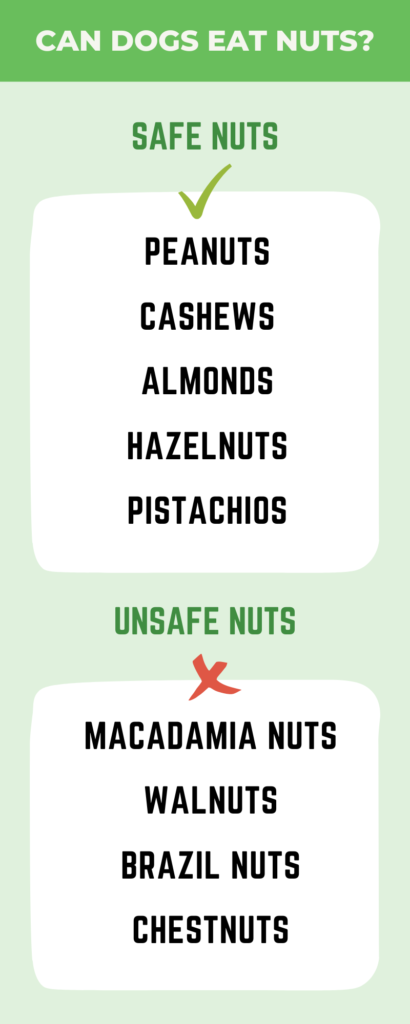
Safe Nuts for Dogs
While nuts are a delicious treat for many humans, it’s important to be mindful that not all nuts are safe for our furry friends. Luckily, there are a few varieties that can be enjoyed by dogs in moderation, providing them with valuable nutrients and a tasty snack. Let’s delve into the world of safe nuts for dogs, exploring their benefits and potential drawbacks:
Peanuts
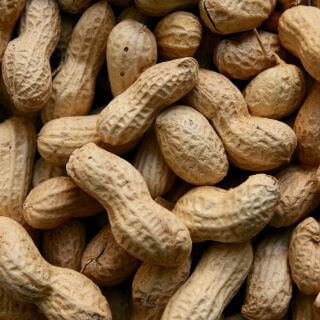
These humble legumes, technically not nuts, pack a punch of protein and healthy fats. Unsalted and unflavored peanuts can be offered to dogs as occasional treats, but remember, moderation is key. Too much peanut indulgence can lead to stomach upset or even pancreatitis due to their high fat content. Start with small pieces and monitor your dog’s reaction before incorporating them into their regular routine.
Cashews
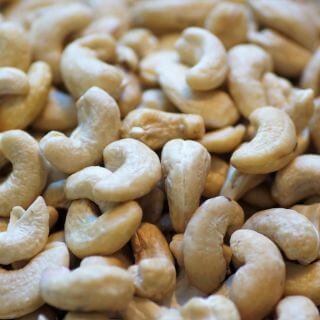
These creamy, cashew-shaped nuts can be a delightful treat for your dog, but only in their plain, unsalted form. Roasted cashews are preferred over raw ones, as the roasting process neutralizes a toxin present in raw cashews. However, even roasted cashews are high in fat, so moderation is crucial. Consider offering them as a training reward or a special occasional treat, always mindful of portion size.
Almonds
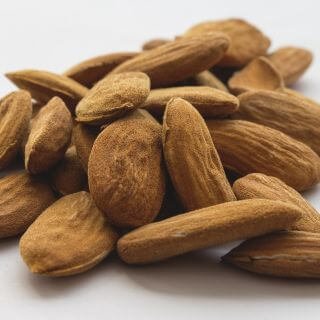
Rich in vitamin E and healthy fats, almonds can be a nutritious addition to your dog’s diet in small quantities. However, due to their high fat content and potential choking hazard from the shells, it’s important to offer them cautiously. Opt for unsalted, shelled almonds and break them into small pieces before giving them to your dog. Monitor their reaction closely and avoid giving them too many, as it can lead to digestive issues.
Hazelnuts
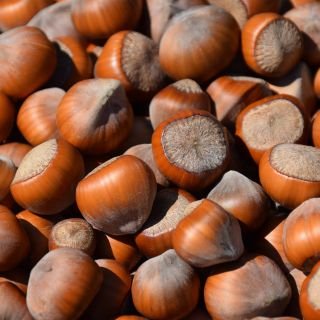
These crunchy nuts can be a fun and healthy treat for your dog, but only if they’re offered without the shell. The shells are a choking hazard and difficult for dogs to digest. Choose unsalted, shelled hazelnuts and break them into small pieces to avoid any potential problems. Remember, moderation is key with hazelnuts too, due to their fat content.
Pistachios
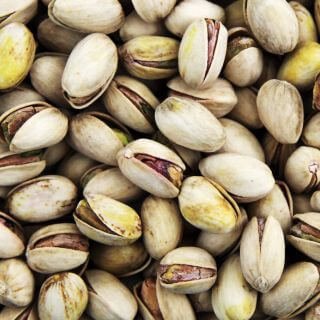
While not as toxic as other nuts, pistachios still require caution for dogs. The shells pose a choking hazard, and the high-fat content can cause digestive upset. If you choose to offer pistachios to your dog, opt for unsalted, shelled ones and only in very small quantities as an occasional treat.
These nuts provide dogs with protein, healthy fats, and certain vitamins, benefiting their overall health when consumed in moderation.
Toxic Nuts to Avoid
While some nuts can be enjoyed by dogs in moderation, others pose serious health risks and should be strictly avoided. Let’s explore the “nutty underworld” of dangers to keep your furry friend safe:
Macadamia Nuts
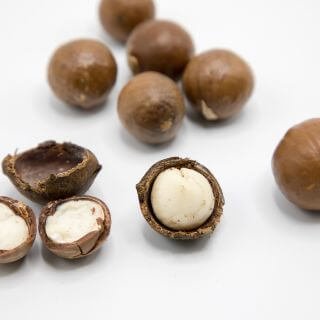
These deceptively delicious nuts are highly toxic to dogs, even in small amounts. Ingestion can lead to a cascade of unpleasant symptoms like vomiting, diarrhea, tremors, weakness, muscle stiffness, and even hyperthermia (overheating). The exact toxin responsible is still unknown, but the effects can be quite severe. Keep these “maca-danger” nuts far out of reach of your canine companion.
Walnuts
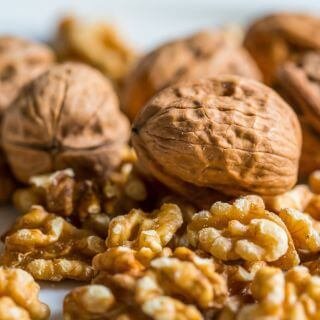
While not as potent as macadamia nuts, walnuts still pose a threat to dogs due to their high-fat content. This can overwhelm their digestive system, leading to vomiting, diarrhea, and potentially pancreatitis, a painful inflammation of the pancreas. Additionally, the mold that can grow on walnuts can be toxic to dogs, adding another layer of risk. Opt for safer alternatives and steer clear of these “walnut woes.”
Pecans

Much like their walnut counterparts, pecans pack a high-fat punch that can wreak havoc on your dog’s digestive system. Vomiting, diarrhea, and pancreatitis are potential consequences of indulging in these “pecan perils.” Additionally, the mold that can grow on pecans poses another danger. Remember, prevention is key, so keep these nuts off your dog’s menu.
Brazil Nuts
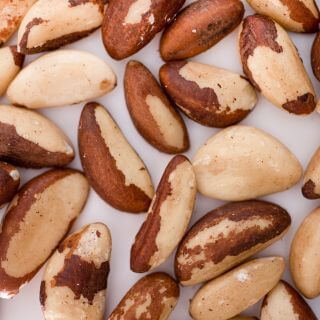
These seemingly harmless nuts harbor a surprising secret – they contain selenium in levels toxic to dogs. Even a small amount can cause lethargy, vomiting, abdominal pain, weakness, and difficulty breathing. In severe cases, it can even lead to organ failure. Don’t let these “Brazil bombs” endanger your dog’s health.
Chestnuts
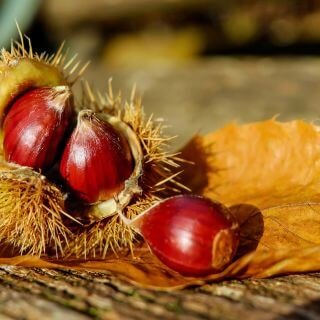
While offering a tempting earthy flavor, chestnuts are a definite no-go for dogs. They contain tannic acid, which can cause vomiting, diarrhea, and abdominal pain. In addition, the potential for choking hazards and intestinal blockages due to the tough shells makes them even more dangerous. Steer clear of these “chestnut calamities” and choose safer treat options.
Ingesting these toxic nuts can result in vomiting, diarrhea, lethargy, and even liver damage or death in severe cases. It is importance to keep these nuts away from your canine companion’s reach.
The Impact of Nuts on Dogs’ Health
Nutritional Value
Nuts are high in protein, fiber, and healthy fats. They also contain vitamins and minerals such as vitamin E, magnesium, and potassium. However, dogs do not require as much protein as humans do, and excessive fat intake can lead to obesity and other health problems.
Potential Health Risks
Some nuts can be toxic to dogs and cause serious health problems. Macadamia nuts, for example, can cause vomiting, hyperthermia, and tremors. Similarly, walnuts and pecans can cause gastrointestinal upset and pancreatitis due to their high-fat content.
Another concern is the risk of choking or intestinal blockage. Nuts are hard and can be difficult for dogs to digest, especially if they are not chewed properly. This can lead to a blockage in the digestive tract, which can be life-threatening if not treated promptly.
It is important to note that some dogs may have an allergic reaction to certain types of nuts. Symptoms of an allergic reaction include itching, swelling, and difficulty breathing. If your dog shows any signs of an allergic reaction, seek veterinary attention immediately.
Types of Nuts and Their Effects on Dogs
| Nut | Safe for Dogs? | Moderation Needed? | Potential Issues |
|---|---|---|---|
| Almonds | No | N/A | High fat content, difficult to digest, can cause gastrointestinal upset (vomiting, diarrhea) |
| Peanuts | Yes | Yes | Unsalted and unflavored only, avoid xylitol in peanut butter |
| Walnuts | No | N/A | Toxin (juglone) can cause gastrointestinal upset, seizures, pancreatitis |
| Macadamia Nuts | No | N/A | Highly toxic, even small amounts can cause vomiting, hyperthermia, tremors, lethargy |
| Cashews | Yes | Yes | High fat content, can cause gastrointestinal upset |
| Chestnuts | Yes | Yes | Cook and peel first to avoid choking hazards |
| Pecans | No | N/A | High fat content, can cause pancreatitis |
| Hazelnuts | No | N/A | High fat content, can cause pancreatitis |
| Brazil Nuts | No | N/A | High selenium content, toxic to dogs, can cause lethargy, vomiting, abdominal pain, organ failure |
| Pistachios | No | N/A | High fat content, shells pose choking hazard |
| Pine Nuts | No | N/A | Can cause gastrointestinal upset, pancreatitis |
Alternatives to Nuts for Dogs
While some nuts may be safe for dogs to eat, it is always better to err on the side of caution. If you want to give your furry friend a treat, there are plenty of safe alternatives to nuts that you can offer.
Fruits
Dogs love fruits, and they are a great source of vitamins and minerals. Some safe options include apples, bananas, blueberries, and strawberries. However, be sure to remove any seeds or pits as they can be toxic to dogs.
Treat your furry friend to refreshing and nutritious snacks. Explore fruits for dogs in this informative article.
Vegetables
Vegetables are another healthy option for dogs. Carrots, green beans, and sweet potatoes are all safe and can be given raw or cooked. Avoid giving your dog onions, garlic, or mushrooms as they can be toxic.
Enhance your pup’s health with dog-friendly veggies. Check out this article on incorporating vegetables into their diet
Meat
Dogs are carnivores, so meat is always a good option. Cooked chicken, beef, and turkey are all safe choices. Just be sure to remove any bones as they can be a choking hazard.
Unlock the nutritional benefits of meat for your furry companion. Dive into this article exploring the role of meat in a dog’s diet
Seafoods
Seafoods present a nutritious addition to a dog’s diet. Salmon is rich in omega-3 fatty acids, supporting heart health and promoting a shiny coat. Opt for cooked shrimp as a protein source, but avoid excessive feeding due to its high cholesterol content.
Discover the nutritional advantages of seafood for your canine friend. Delve into this comprehensive guide exploring the significance of seafood in your dog’s diet.
Dairy
Dogs can tolerate small amounts of dairy. Plain yogurt and cottage cheese are both safe options and can provide some extra protein and calcium.
Commercial Dog Treats
If you want to give your dog a special treat, there are plenty of commercial dog treats available. Look for treats that are made with high-quality ingredients and avoid those that contain artificial preservatives, colors, or flavors.
Additionally, there are fruits, vegetables, meats, grains and other foods that can be safely given to dogs.
Conclusion
In conclusion, while some nuts are safe for dogs to eat, it is generally recommended to avoid feeding nuts to dogs due to the potential risks involved. Dogs have a different digestive system than humans and some nuts can be toxic to them, causing digestive issues, vomiting, diarrhea, and even pancreatitis.
It is important for dog owners to be aware of the risks associated with feeding nuts to their pets and to consult with their veterinarian before introducing any new foods into their dog’s diet. Additionally, it is important to note that even small amounts of certain nuts, such as macadamia nuts, can be extremely dangerous to dogs and should be avoided completely.
If a dog accidentally consumes nuts or shows any signs of illness after consuming nuts, it is important to seek veterinary care immediately. With proper care and attention, dog owners can ensure that their pets stay healthy and happy for years to come.
Frequently Asked Questions
Are Any Nuts Safe for Dogs to Eat?
Not all nuts are safe for dogs to eat. Some nuts, such as macadamia nuts, can be toxic to dogs and cause vomiting, fever, and muscle tremors. However, there are a few nuts that are safe for dogs to eat in moderation, such as peanuts, almonds, and cashews.
What Are the Risks of Feeding Nuts to Dogs?
Feeding nuts to dogs can pose several risks. Nuts are high in fat, which can lead to gastrointestinal upset, including diarrhea and vomiting. Nuts can also cause an obstruction in the digestive tract, which can be life-threatening if not treated promptly.
Can Dogs Have Peanut Butter?
Yes, dogs can have peanut butter in moderation. Peanut butter is high in fat and calories, so it should only be given to dogs as an occasional treat. It’s important to choose a peanut butter that does not contain xylitol, a sugar substitute that can be toxic to dogs.
